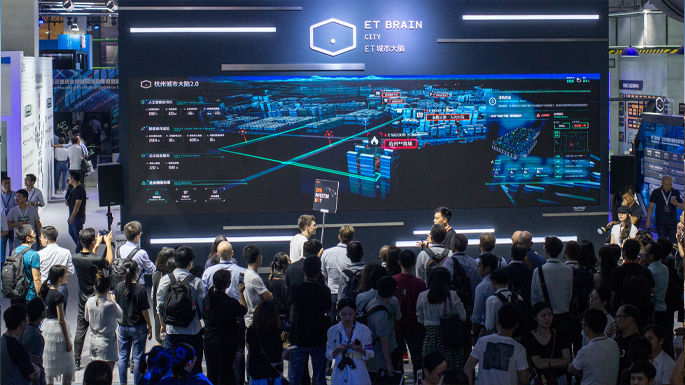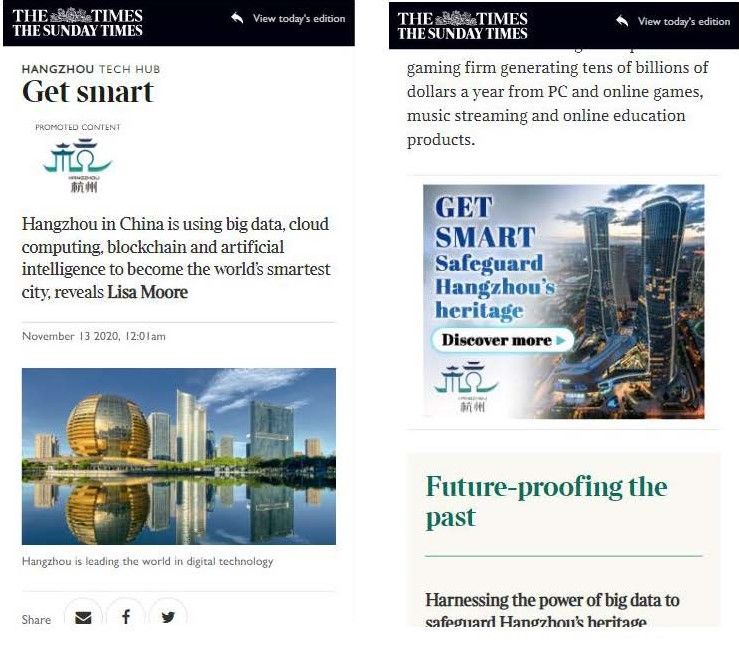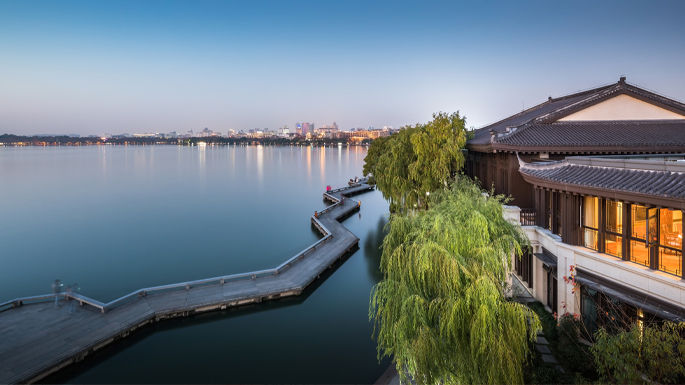新华社客户端
导读:在世界主要经济体中,中国经济已率先走出疫情困境,以中国杭州为代表的数字经济技术和应用,正成为新一轮高质量发展的重要引擎。近日,英国泰晤士报刊文《杭州:数字经济之都——让城市更聪明》关注后疫情时代在新发展理念引领下的中国经济。
“Hangzhou in China is utilising big data, cloud computing, blockchain and artificial intelligence technologies to become the world’s smartest city.”
“中国杭州正在利用大数据、云计算、区块链和人工智能技术,成为世界上最聪明的城市。”
当地时间11月13日,英国主流大报泰晤士报刊发题为《Hangzhou tech hub:GET SMART》(杭州:数字经济之都——让城市更聪明)整版文章,多角度聚焦杭州数字经济发展,围绕“城市大脑”迭代升级、城市数字治理、数字技术赋能遗产保护等方面,生动展现杭州这座东方文明古都的数字基因和创新活力。泰晤士报发文中特别指出,杭州以“中国数字经济第一城”的定位,引领全球数字经济发展。

泰晤士报整版刊发杭州“数字经济”为主题的文章版面
全球创新的先锋军 数字经济的领军者
文章称,早在杭州作为古代吴越的都城时,就以积极的方式发展贸易和商业,这种风格延续至今,使其成为中国的创业创新中心,拥有巨大的电子商务市场。许多科技巨头总部、数十家独角兽企业落户杭州,成为中国最繁荣的城市之一。

泰晤士报官网同步发文截图
为了阐释杭州是如何发展成为地球上最聪明的城市,泰晤士报在探寻后发现了杭州的治理“法宝”——“城市大脑”。

杭州云栖大会现场
文章称,从2016年杭州为治理交通拥堵,率先在国内提出建设城市大脑,到向智慧治城加速进化,让提供更加精准的公共服务成为现实,再到2020年3月“城市大脑”推出企业服务平台——“亲清在线”,短短4年时间里,“城市大脑”不断迭代升级。在杭州,“数字”不仅仅是一种经济形态,也是一种生活方式,深入每个角落、影响每个家庭、惠及每个市民。
而杭州不断进步的数字生态圈也助力了当地企业的发展,线上直播、跨境直播、快捷的线下配送、自动驾驶出租车……

线上直播连通全球市场和买家
“这些创新与突破正在让城市的生活变得更容易、更清洁、更安全,杭州无疑是全球创新的先锋军,数字经济的领军者。”泰晤士报在文章中如是评价。

泰晤士报手机移动端同步发文截图
泰晤士报称赞:杭州利用大数据的力量保护历史文化遗产
文章称,杭州自秦设县治以来拥有许多重要的文化和历史遗迹,仅2019年就吸引了2.08亿来自国内的游客,创造了590亿美元的旅游收入。同时杭州正通过技术来使当地的文化遗产变得鲜活。为保护其完整性,正利用大数据的力量改善游客体验。

几个世纪以来,美丽的西湖为作家和艺术家们带来了无尽的灵感
在神圣的良渚古城遗址,科技被用来为每年不少于150万的游客创造更身临其境的体验。这个114平方公里的公园已经覆盖了5G网络,允许游客获得虚拟导游服务和背景信息,并在社交媒体上分享他们的经历。
泰晤士报笔下的杭州不仅是世界最聪明的城市,这里也是千百年来无数作家和艺术家们的灵感之地。
这个将文化、历史、城市数字基因有机相融的城市,是中国最值得去的城市之一。
附泰晤士报刊发全文:
Hangzhou tech hub
GET SMART
Hangzhou in China is using big data, cloud computing, blockchain and artificial intelligence to become the world’s smartest city, reveals Lisa Moore
Hangzhou has long taken a progressive approach to trade and commerce, which can be traced back to when the city was the capital of the ancient Wuyue kingdom.
Fast-forward over 1,000 years and you’ll find the fruits of that history. Hangzhou is one of China’s most prosperous cities: an enterprise and innovation hub, home to many of Asia’s tech giants and dozens of unicorns, and the driving force behind huge ecommerce markets.
The city’s impressive tech heritage has made it a centre for entrepreneurship. Its most famous go-getter is Jack Ma, founder of Alibaba, which in 21 years has grown to become the world’s biggest online commerce company. It offers ecommerce, logistics, cloud and digital media services, as well as online health and entertainment subscription software. It’s no understatement to say that Hangzhou has reshaped Chinese life.
A centre of digital firsts, Hangzhou has been dubbed “China’s smartest city”. This billing dates back to 2016, when, in an attempt to tackle chronic traffic problems, Hangzhou launched “City Brain”, an online platform using big data, cloud computing, blockchain and artificial intelligence to carry out real-time analysis and management of the whole city.
Within a year City Brain had taken control of 128 traffic lights in Hangzhou, reducing the traffic waiting time by 15 per cent, and cutting ambulance delays by 50 per cent. Chronic hospital parking problems were solved, as City Brain calculated the best routes, cutting the time it took to find a parking space from 90 minutes to 15.
Hangzhou has added a corporate service platform, Qinqing Online, to City Brain: it’s a one-stop shop for businesses and the services they need. Digital governance through data collaboration, as well as reduction of approval materials and other methods, means business approval times are being cut by up to 80 per cent.
City Brain benefits the daily life of residents. Hangzhou was the first city to introduce QR code-based scan-to-ride public transport tickets, as well as contactless parking. The city’s public transport, urban management and health systems are smart too, using blockchain technology to process a staggering 120 million pieces of data a day. And the contactless Hangzhou Resident Card is a convenient mobile app allowing locals to manage everything from booking a rental bicycle, library online lending and looking for empty parking spaces to reserving scenic spots and settling their annual tax bill.
Hangzhou’s progressive digital ecosphere has acted as a catalyst for local companies, which have developed applications such as facial recognition technology, intelligent robots and wearable security. In fact, the city’s businesses and their technologies are the vanguard of global innovation, from the autonomous driving startup to the gaming firm generating tens of billions of dollars a year from PC and online games, music streaming and online education products.
Digital winners
The innovations that are making life in China easier, cleaner and safer.
Since the pandemic, marketing via live-streaming has been connecting Chinese buyers with overseas markets and allowing sellers to effectively showcase products.
Hangzhou’s City Brain, which assesses traffic and times signals to ease congestion, has helped to reduce emergency vehicle response times by 50 per cent.
In the early days of the coronavirus outbreak in China, live streams and delivery services allowed residents to source fresh produce from nearby farmers’ markets.
Local automotive partnerships are working to put self-driving robo-taxis on the streets of Hangzhou within the next two years.
Future-proofing the past
Harnessing the power of big data to safeguard Hangzhou’s heritage.
More than 2,000 years of history have given Hangzhou scores of culturally and historically important sites, which attracted 208 million tourists from across China in 2019, generating over $59 billion. Among its most notable attractions are: West Lake, whose atmospheric beauty has inspired writers and artists for centuries, and which attracts thousands of walkers and cyclists; the archaeological ruins of sacred Liangzhu City, a Unesco World Heritage site encapsulating 5,000 years of Chinese civilisation; the Chan Buddhist Lingyin Temple, which was built in the Wulin Mountains in 328AD and features many grottos and elaborate rock carvings; and the Beijing-Hangzhou Grand Canal, another Unesco site and the oldest and longest manmade waterway in the world.
Technology is being used to bring the region’s heritage to life while preserving its integrity. Working with China’s leading mobile phone operators and mobile payment platforms, the city of Hangzhou has harnessed the power of big data to improve the tourist experience. Want to visit popular sites such as the Su Causeway or the Qianjiang New Light Show, but worried they might be busy? Follow Hangzhou Digital Tourism, the bureau’s official WeChat mini-program, for real-time information on visitor numbers and the least crowded times to visit. The app will also allow you to make reservations to visit Hangzhou’s parks (booking is a new requirement under Covid-19 prevention and control measures)
At the sacred site of Liangzhu, technology is creating a more immersive experience for the 1.5 million people who visit each year. The 114 sq km park has been blanketed with 5G coverage, allowing visitors to access virtual guides and background information, and share their experiences on social media.

